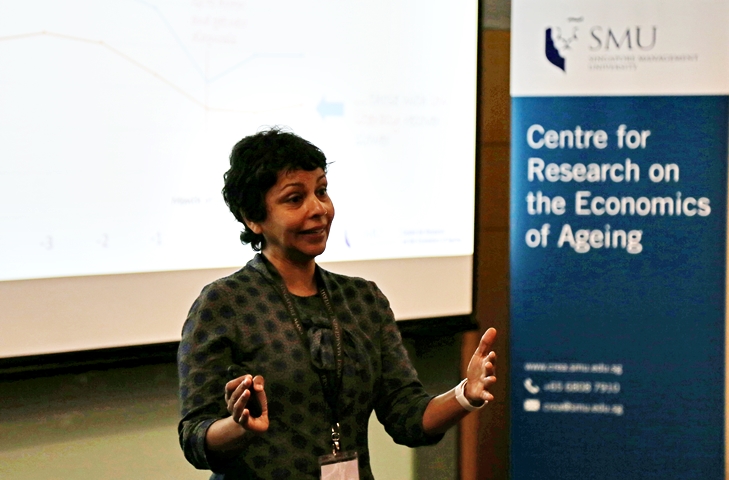
Back to Research@SMU Events Feature Series
By Sim Shuzhen
SMU Office of Research & Tech Transfer – Growing old is as inevitable as the passage of time. But what can we do to make our twilight years a positive and healthy period, rather than one of unavoidable decline?
This is a critical question for Singapore, home to one of the fastest-ageing populations in the world. The number of Singaporeans aged 65 and above is expected to triple to 900,000 by 2030, a demographic shift that will have major implications for both public policy and personal lives.
With this in mind, the Singapore Management University (SMU) in 2014 established the Centre for Research on the Economics of Ageing (CREA) to study healthcare and economic policy issues facing the elderly. Since 2015, the Singapore Life Panel® (SLP) – the Centre’s flagship research project – has been gathering data from some 12,500 Singaporeans aged 50 to 70 on a monthly basis.
“We're at a point in the development and evolution of the Centre where we want to broaden the scope of our research questions,” said Professor Bryce Hool, CREA director and dean of the SMU School of Economics. “We want to take a truly multidisciplinary approach towards addressing the very complex issues faced by an ageing population.”
Professor Hool was speaking on 5 May at the first of four CREA roundtable sessions planned for 2017. The session, organised to share preliminary findings from the SLP and to gather feedback and suggestions, was attended by a diverse group of clinicians, healthcare workers, researchers and policy-makers.
Affording healthcare
“To understand the economic and health-related circumstances of the elderly, the SLP collects a wealth of data on income, work, spending, health, literacy and other indicators via online surveys,” said CREA associate director Ms Jiaming Ju.
Dr Terence Cheng, a research fellow at CREA, uses the data to understand Singaporeans’ healthcare spending patterns. “On average, SLP respondents spent S$153 a month – about four percent of their total household expenditure – on healthcare,” he said.
About four percent of respondents, however, experienced catastrophic healthcare spending, defined as allocating more than 25 percent of non-food household spending to healthcare over a 12-month period.
Respondents with two or more chronic conditions – such as heart disease or diabetes – were three times more likely to report this, said Dr Cheng. In addition, although respondents living in one- or two-room Housing Development Board (HDB) flats used a larger percentage of their monthly expenditure for healthcare, they were no more likely to report catastrophic spending than respondents living in larger dwellings. “We speculate this might be due to well-targeted subsidies and assistance from the government,” said Dr Cheng.
Dealing with health shocks
Household finances are likely to be affected if a family member is diagnosed with a major chronic condition such as heart disease, cancer or stroke, or even with a minor one such as diabetes or hypertension. In the SLP data, such chronic ‘health shocks’ were linked to an increase in healthcare expenditure, which persisted for four to six months after the shock, said Dr Cheng.
“The data also revealed gender-related differences in how health shocks impacted household income,” said Dr Cheng. Households experienced a larger drop in income when a male respondent, as opposed to a female one, was hit by a health shock, reflecting the fact that men are more often the main breadwinners.
“Consistent with this, while women reported bringing in more income after their husbands experienced a health shock – to help cover medical bills and replace the husband’s lost income – this tends not to be true in reverse,” said Dr Cheng.
Literacy and health
In addition to healthcare economics, CREA also focuses on health-related behaviours. CREA senior research fellow Professor Rhema Vaithianathan uses data from the SLP to study the factors that drive people to require and seek healthcare.
While respondents with two or more chronic conditions reported more frequent doctor visits, this effect did not change with age. “Healthcare utilisation is not driven by ageing; it's driven by chronic conditions,” said Professor Vaithianathan. “A 70-year-old who has no chronic conditions is less likely to go to a doctor than a 50-year-old with two or more chronic conditions.”
The researchers also measured respondents’ self-rated health literacy – their ability to understand medical information – and looked at how this affected their health.
“We found that self-assessed health is strongly driven by health literacy,” said Professor Vaithianathan. “Across all age groups, those with low health literacy report consistently lower levels of health status, even after accounting for education.”
Also, respondents with lower health literacy recovered more slowly after a health shock compared to the rest of the study population. “This suggests that when people with low health literacy visit the doctor, they get less out of it,” she added.
Focusing on opportunities
With the rich data coming out of the SLP, CREA researchers are also studying numerous other health- and ageing-related issues.
Professor Vaithianathan, for example, is also investigating the effect of behavioural risk factors such as eating habits, drinking, smoking and obesity on health. For instance, the researchers have found that working women are more likely than their non-working counterparts to eat out at hawker centres and fast food restaurants.
“Given that more women will be working to older ages in the future, it will be important to consider how such demographic shifts will affect eating patterns in Singapore,” said Professor Vaithianathan.
One of the roundtable’s suggestions was for CREA researchers to also take a closer look at SLP respondents who aged well, in order to understand the determinants of reduced healthcare expenditure, ability to work and sense of well-being. Focusing on the economic opportunities, rather than on the economic burden of ageing, the panel agreed, would be a good mindset for the future.
See More News
Want to see more of SMU Research?
Sign up for Research@SMU e-newslettter to know more about our research and research-related events!
If you would like to remove yourself from all our mailing list, please visit https://eservices.smu.edu.sg/internet/DNC/Default.aspx
